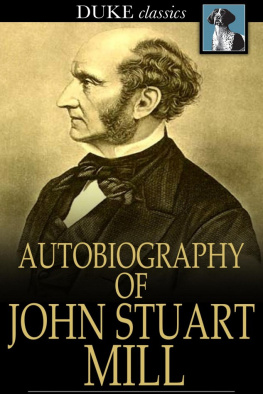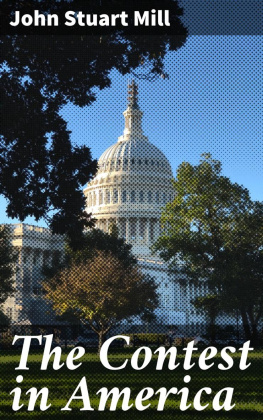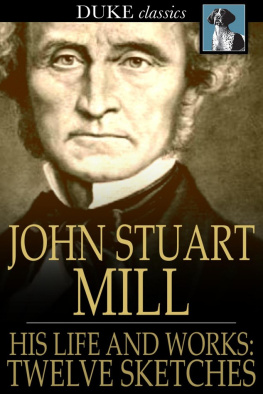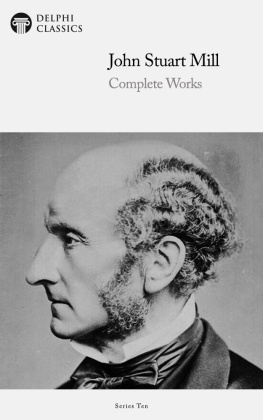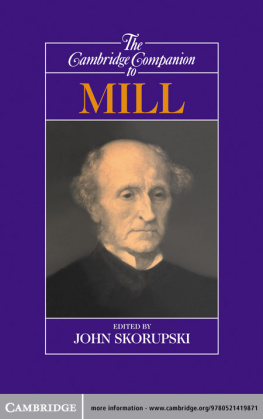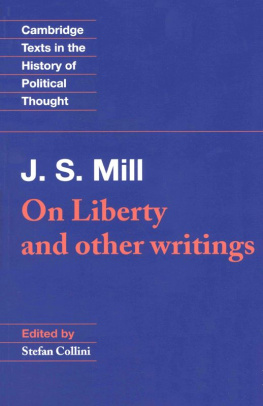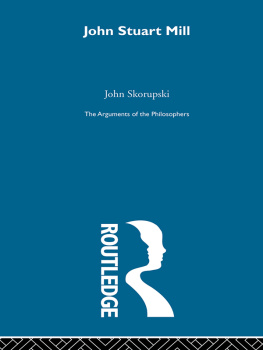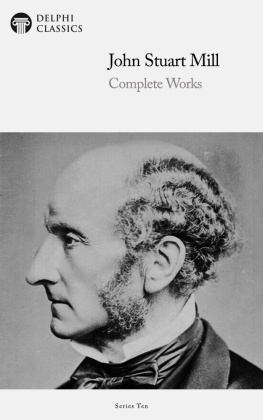Mill John Stuart - Essays on some unsettled Questions of Political Economy
Here you can read online Mill John Stuart - Essays on some unsettled Questions of Political Economy full text of the book (entire story) in english for free. Download pdf and epub, get meaning, cover and reviews about this ebook. genre: Science. Description of the work, (preface) as well as reviews are available. Best literature library LitArk.com created for fans of good reading and offers a wide selection of genres:
Romance novel
Science fiction
Adventure
Detective
Science
History
Home and family
Prose
Art
Politics
Computer
Non-fiction
Religion
Business
Children
Humor
Choose a favorite category and find really read worthwhile books. Enjoy immersion in the world of imagination, feel the emotions of the characters or learn something new for yourself, make an fascinating discovery.
- Book:Essays on some unsettled Questions of Political Economy
- Author:
- Genre:
- Rating:3 / 5
- Favourites:Add to favourites
- Your mark:
- 60
- 1
- 2
- 3
- 4
- 5
Essays on some unsettled Questions of Political Economy: summary, description and annotation
We offer to read an annotation, description, summary or preface (depends on what the author of the book "Essays on some unsettled Questions of Political Economy" wrote himself). If you haven't found the necessary information about the book — write in the comments, we will try to find it.
Mill John Stuart: author's other books
Who wrote Essays on some unsettled Questions of Political Economy? Find out the surname, the name of the author of the book and a list of all author's works by series.
Essays on some unsettled Questions of Political Economy — read online for free the complete book (whole text) full work
Below is the text of the book, divided by pages. System saving the place of the last page read, allows you to conveniently read the book "Essays on some unsettled Questions of Political Economy" online for free, without having to search again every time where you left off. Put a bookmark, and you can go to the page where you finished reading at any time.
Font size:
Interval:
Bookmark:
The Project Gutenberg EBook of Essays on some unsettled Questions of
Political Economy, by John Stuart Mill
This eBook is for the use of anyone anywhere at no cost and with
almost no restrictions whatsoever. You may copy it, give it away or
re-use it under the terms of the Project Gutenberg License included
with this eBook or online at www.gutenberg.net
Title: Essays on some unsettled Questions of Political Economy
Author: John Stuart Mill
Release Date: April 9, 2004 [EBook #12004]
Language: English
Character set encoding: ISO Latin-1
*** START OF THIS PROJECT GUTENBERG EBOOK ESSAYS ON SOME UNSETTLED ***
Produced by Avinash Kothare and Marc D'Hooghe
Of these Essays, which were written in 1829 and 1830, the fifth alone has been previously printed. The other four have hitherto remained in manuscript, because, during the temporary suspension of public interest in the species of discussion to which they belong, there was no inducement to their publication.
They are now published (with a few merely verbal alterations) under the impression, that the controversies excited by Colonel Torrens' Budget have again called the attention of political economists to the discussions of the abstract science: and from the additional consideration, that the first paper relates expressly to the point upon which the question at issue between Colonel Torrens and his antagonists has principally turned.
From that paper it will be seen that opinions identical in principle with those promulgated by Colonel Torrens (there would probably be considerable difference as to the extent of their practical application) have been held by the writer for more than fifteen years: although he cannot claim to himself the original conception, but only the elaboration, of the fundamental doctrine of the Essay.
A prejudice appears to exist in many quarters against the theory in question, on the supposition of its being opposed to one of the most valuable results of modern political philosophy, the doctrine of Freedom of Trade between nation and nation. The opinions now laid before the reader are presented as corollaries necessarily following from the principles upon which Free Trade itself rests. The writer has also been careful to point out, that from these opinions no justification can be derived for any protecting duty, or other preference given to domestic over foreign industry. But in regard to those duties on foreign commodities which do not operate as protection, but are maintained solely for revenue, and which do not touch either the necessaries of life or the materials and instruments of production, it is his opinion that any relaxation of such duties, beyond what may be required by the interest of the revenue itself, should in general be made contingent upon the adoption of some corresponding degree of freedom of trade with this country, by the nation from which the commodities are imported.
PREFACE.
CONTENTS.
ESSAY I.
ESSAY II.
ESSAY III.
ESSAY IV.
ESSAY V.
ESSAY I.
Of the Laws of Interchange between Nations; and the Distribution of the Gains of Commerce among the Countries of the Commercial World
ESSAY II.
Of the Influence of Consumption upon Production
ESSAY III.
On the Words Productive and Unproductive
ESSAY IV.
On Profits, and Interest
ESSAY V.
On the Definition of Political Economy; and on the Method of Investigation proper to it
Of the truths with which political economy has been enriched by Mr. Ricardo, none has contributed more to give to that branch of knowledge the comparatively precise and scientific character which it at present bears, than the more accurate analysis which he performed of the nature of the advantage which nations derive from a mutual interchange of their productions. Previously to his time, the benefits of foreign trade were deemed, even by the most philosophical enquirers, to consist in affording a vent for surplus produce, or in enabling a portion of the national capital to replace itself with a profit. The futility of the theory implied in these and similar phrases, was an obvious consequence from the speculations of writers even anterior to Mr. Ricardo. But it was he who first, in the chapter on Foreign Trade, of his immortal Principles of Political Economy and Taxation, substituted for the former vague and unscientific, if not positively false, conceptions with regard to the advantage of trade, a philosophical exposition which explains, with strict precision, the nature of that advantage, and affords an accurate measure of its amount.
He shewed, that the advantage of an interchange of commodities between nations consists simply and solely in this, that it enables each to obtain, with a given amount of labour and capital, a greater quantity of all commodities taken together. This it accomplishes by enabling each, with a quantity of one commodity which has cost it so much labour and capital, to purchase a quantity of another commodity which, if produced at home, would have required labour and capital to a greater amount. To render the importation of an article more advantageous than its production, it is not necessary that the foreign country should be able to produce it with less labour and capital than ourselves. We may even have a positive advantage in its production: but, if we are so far favoured by circumstances as to have a still greater positive advantage in the production of some other article which is in demand in the foreign country, we may be able to obtain a greater return to our labour and capital by employing none of it in producing the article in which our advantage is least, but devoting it all to the production of that in which our advantage is greatest, and giving this to the foreign country in exchange for the other. It is not a difference in the absolute cost of production, which determines the interchange, but a difference in the comparative cost. It may be to our advantage to procure iron from Sweden in exchange for cottons, even although the mines of England as well as her manufactories should be more productive than those of Sweden; for if we have an advantage of one-half in cottons, and only an advantage of a quarter in iron, and could sell our cottons to Sweden at the price which Sweden must pay for them if she produced them herself, we should obtain our iron with an advantage of one-half, as well as our cottons. We may often, by trading with foreigners, obtain their commodities at a smaller expense of labour and capital than they cost to the foreigners themselves. The bargain is still advantageous to the foreigner, because the commodity which he receives in exchange, though it has cost us less, would have cost him more. As often as a country possesses two commodities, one of which it can produce with less labour, comparatively to what it would cost in a foreign country, than the other; so often it is the interest of the country to export the first mentioned commodity and to import the second; even though it might be able to produce both the one and the other at a less expense of labour than the foreign country can produce them, but not less in the same degree; or might be unable to produce either except at a greater expense, but not greater in the same degree.
On the contrary, if it produces both commodities with greater facility, or both with greater difficulty, and greater in exactly the same degree, there will be no motive to interchange.
Font size:
Interval:
Bookmark:
Similar books «Essays on some unsettled Questions of Political Economy»
Look at similar books to Essays on some unsettled Questions of Political Economy. We have selected literature similar in name and meaning in the hope of providing readers with more options to find new, interesting, not yet read works.
Discussion, reviews of the book Essays on some unsettled Questions of Political Economy and just readers' own opinions. Leave your comments, write what you think about the work, its meaning or the main characters. Specify what exactly you liked and what you didn't like, and why you think so.







